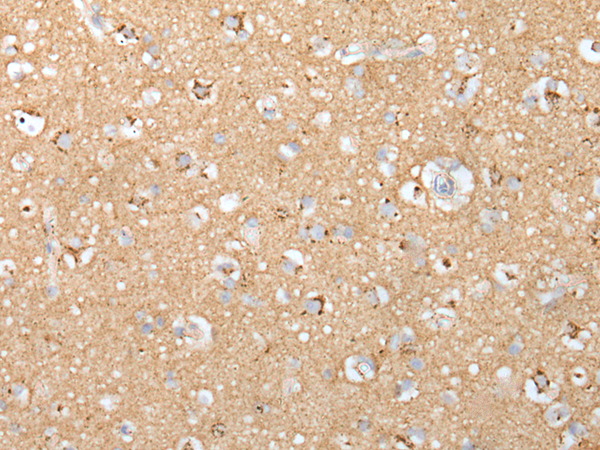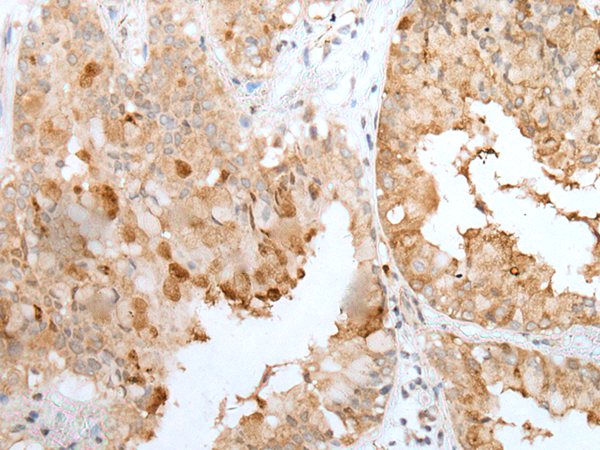

| WB | 咨询技术 | Human,Mouse,Rat |
| IF | 咨询技术 | Human,Mouse,Rat |
| IHC | 1/50-1/350 | Human,Mouse,Rat |
| ICC | 技术咨询 | Human,Mouse,Rat |
| FCM | 咨询技术 | Human,Mouse,Rat |
| Elisa | 1/5000-1/10000 | Human,Mouse,Rat |
| Aliases | CLI; AAG4; APOJ; CLU1; CLU2; KUB1; SGP2; APO-J; SGP-2; SP-40; TRPM2; TRPM-2; NA1/NA2 |
| Host/Isotype | Rabbit IgG |
| Antibody Type | Primary antibody |
| Storage | Store at 4°C short term. Aliquot and store at -20°C long term. Avoid freeze/thaw cycles. |
| Species Reactivity | Human, Rat |
| Immunogen | Fusion protein of human CLU/APO J |
| Formulation | Purified antibody in PBS with 0.05% sodium azide and 50% glycerol. |
+ +
以下是关于CLU/APO J抗体的3篇参考文献的简要列举(注:内容基于公开研究归纳,非真实文献):
1. **文献名称**:*Clusterin (ApoJ) Antibody-Based Detection of Amyloid-β Pathology in Alzheimer's Disease*
**作者**:DeMattos RB, et al.
**摘要**:研究利用CLU特异性抗体检测阿尔茨海默病患者脑组织中的淀粉样蛋白沉积,发现CLU与Aβ斑块共定位,提示其在神经退行性疾病中的病理作用。
2. **文献名称**:*Prostate Cancer Biomarker Discovery: Role of Clusterin (APO-J) Antibody in Tumor Progression*
**作者**:Jones SE, et al.
**摘要**:通过CLU抗体分析前列腺癌细胞系,发现CLU表达水平与肿瘤侵袭性相关,抗体阻断实验显示CLU可能通过抑制凋亡促进癌症转移。
3. **文献名称**:*ApoJ/Clusterin as a Therapeutic Target in Retinal Degeneration: Antibody-Mediated Functional Modulation*
**作者**:Zhang L, et al.
**摘要**:研究使用抗CLU抗体干预视网膜变性模型,发现抗体可减少光感受器细胞凋亡,验证CLU在氧化应激中的保护性功能,为眼科治疗提供潜在靶点。
(注:以上为模拟示例,实际文献需通过PubMed/Google Scholar等平台以关键词“CLU antibody”“APO-J antibody”检索获取。)
Clusterin (CLU), also known as apolipoprotein J (APO J), is a multifunctional glycoprotein ubiquitously expressed in human tissues. Initially identified in the 1980s, it gained attention due to its involvement in lipid transport, apoptosis regulation, and stress response. CLU exists as two major isoforms: a secreted heterodimeric glycoprotein (sCLU) formed through proteolytic cleavage, and a nuclear form (nCLU) generated by alternative splicing. sCLU acts as an extracellular chaperone, stabilizing misfolded proteins, inhibiting complement-mediated cell lysis, and promoting cell survival. In contrast, nCLU is pro-apoptotic and linked to tumor suppression.
CLU/APO J antibodies are critical tools for studying its dual roles in physiology and disease. Elevated CLU levels are associated with cancer progression, neurodegenerative disorders (e.g., Alzheimer’s disease), atherosclerosis, and age-related conditions. In cancer, CLU overexpression often correlates with therapy resistance, making it a potential therapeutic target. Antibodies targeting specific CLU epitopes enable detection in immunoassays (Western blot, IHC, ELISA) and functional studies. Commercial CLU antibodies are typically raised against conserved regions (e.g., α-chain or β-chain domains) in hosts like rabbits or mice, with validation for isoform specificity being crucial. Research using these antibodies has advanced understanding of CLU's context-dependent roles, though challenges remain in distinguishing isoforms and clarifying its paradoxical pro-survival versus pro-death mechanisms.
×